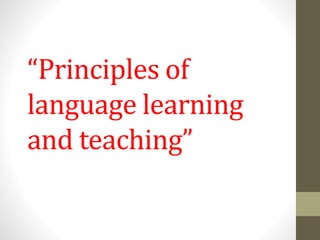
Principles of language learning and teaching
- 1. “Principles of language learning and teaching”
- 2. What is language? • “Language is a complex, specialized skill, which develops in the child spontaneously, without conscious effort or formal instruction“ • "Language is a system of arbitrary conventionalized vocal, written or gestual symbols that enable members of a given community to communicate with one another"
- 3. What is learning? • "Learning is acquiring or getting a knowledge of a subject or a skill by study, experience or instruction“ • "Learning is a relatively permanent change in a behavioral tendency and is the result reinforced practice"
- 4. What is teaching? • "Teaching is showing or helping someone to learn how to do something giving instructions, guiding in the study of something, providing with knowledge"
- 5. Schools of thought in SLA What is Structuralism? • Structuralism proposed a form of analysis based on consideration of language as a system composed of elements that relate to each other and form a structure.
- 6. Schools of thought in SLA What is constructivism? • Knowledge is actively constructed by the cognosc ente subject, not passively received from the environment. • knowing is an adaptive process that organizes the experiential world of one; an independent and pre-existing world outside the mind of the expert is not discovered.
- 7. Theories of first language acquisition Behavioristic approaches • The behavioristic approach focused on the immediately perceptive aspects of linguistic behavior. • A behaviorist might consider effective language behavior to be the production of correct responses to stimuli.
- 8. Theories of first language acquisition The nativist approach • The term nativist is derived from the fundamental assertion that language acquisition is innately determined. • We have an innate capacity to develop languages.
- 9. Theories of first language acquisition Functional approaches • It is the consideration of the study of a language as the investigation of the duties performed by the elements, classes and the mechanisms involved in it; as a result, with this important role.
- 10. What is universal grammar? • Noam Chumsky “Universal grammar is the set of principles, rules and conditions shared by all languages”. • All humans naturally acquire one language either because they have a universal grammar.
- 11. Imitation • Several investigations have demonstrated that imitation is a strategy that children use to learn how to speak. • In his early years, the imitation is the primary method of learning for your child.
- 12. Practice • Practice of the language is associated with the acquisition of language in children. they start practicing one or two words at the same time. • The behaviorist model use the practice and repetition, the key is to form a habit.
- 13. Input • Input are all those sounds that a baby is exposed; phrases, conversations, words, and that the baby will be recognized over time.
- 14. The Critical Period Hypethesis • It is a hypothesis raised by Lenneberg says the ability to acquire language diminishes upon reaching puberty, because the plasticity, circumstances involving a sensitive decrease of the capacity to learn a language.
- 15. First language • It is the language or are the languages a person has learned from birth or within the critical period, or that a person speaks the best and so is often the basis for sociolinguistic identity
- 16. Second language • It is a language that is not the native language of the speaker, but that is used in the locale of that person.
- 17. Bilingualism • It is when a person has two languages mothers, i.e. when to learn two languages since he is a babe and dominates them perfectly.
- 18. Types of learning • Singal learning • Stimulus-response learning • Chaining • Verbal Asociation • Multiple discrimination • Concept learning • Principal learning • Problem solving
- 19. Inductive reasoning • It is a type of reasoning that focuses on the creation of statements generalized from examples or specific events. For example: Jennifer leaves for school at 7:00 a.m. Jennifer is always on time. Jennifer assumes, then, that she will always be on time if she leaves at 7:00 a.m.
- 20. Deductive reasoning • Deductive reasoning differs from the inductive, because it uses generalized concepts to try to get more specific. For this reason is also known as the approach "from top to bottom". Example: Since all humans are mortal, and I am a human, then I am mortal.